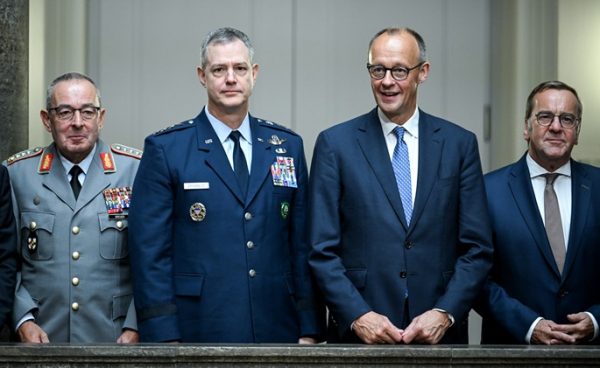Germany paves way for historic return to military service

Germany is "back on the path towards a military service-based army," Chancellor Friedrich Merz said on Wednesday, after his Cabinet backed plans to reintroduce the measure in a voluntary capacity. The move is one of several steps agreed on Wednesday to boost Germany's defence architecture, including the creation of a new National Security Council, in response to geopolitical shifts that are leaving Western Europe more exposed to threats from Russia, reported dpa.
The military service bill, drawn up by Defence Minister Boris Pistorius, creates a new voluntary programme aimed at young men, more than a decade after the country abandoned mandatory conscription in 2011.
Pistorius called the plan – which includes options to make conscription necessary if the recruitment drive is unsuccessful – a "massive step forwards," despite criticism from Merz's conservative Christian Democratic Union (CDU) that it does not go far enough to bolster the Bundeswehr, the German military.
The bill now goes to the Bundestag, the lower house of parliament, where it is likely to be rigorously debated and could yet undergo significant changes.
Eyeing Moscow
The legislative proposal comes as countries across Europe scramble to respond to the threat to security from Russia in the wake of Moscow's full-scale invasion of Ukraine.
Following the Cabinet meeting in Berlin, Merz said "Russia has long been carrying out hybrid attacks against us," highlighting "massive interference" in German democracy and targeted attacks on IT security.
Under NATO capability targets, Germany is due to increase its forces to 260,000 soldiers – meaning an additional 80,000 active troops must be recruited.
The new military service is intended to provide the basis for a larger reserve force. The plan is to begin with 15,000 new recruits and to introduce mandatory medical assessments starting in 2027.
In future, young men will be required to indicate in a questionnaire whether they are willing and able to serve, while women may do so voluntarily.
In order to make service more attractive, conscripts are to be paid a high salary, earning more than €2,000 ($2,320) net per month.
Your country needs you
Merz said he believed the new plans will be sufficient to recruit the tens of thousands of soldiers needed.
"From today's perspective, I am confident that we will achieve the figures we need, at least initially," he said.
Additional measures will have to be judged in the light of developments, he added, referring to the possibility of mandatory service provided for in the bill if not enough volunteers can be recruited.
Pistorius – whose centre-left Social Democratic Party (SPD) has resisted pressure from its conservative coalition partners to move straight to a compulsory service – said the new plan could change the mindset of many young Germans, promoting the ideal of serving the country.
Members of younger generations will have to decide how they can contribute to Germany's security, through debates in families, workplaces, schools and universities, he said.
The Bundeswehr must grow up, added Pistorius, pointing to the international security situation and the threat from Russia.
A strong military is the most effective means of preventing wars, he argued.
National Security Council
Ministers also approved the establishment of a National Security Council (NSC) on Wednesday, aiming to coordinate security policy and enable faster decision-making at times of crisis.
The body, modelled on similar setups in the United States and Britain, will also be tasked with developing long-term strategies to deal with threat scenarios, taking a networked approach to security issues.
Chaired by the chancellor, the NSC will include key ministers as well as officials from allied countries and organizations, including the European Union and NATO.
Following the Cabinet decision, Merz described the council as a central platform for overarching security issues and an important component of a cohesive security policy.
"Security is high on the political agenda" for his government, he said, adding that the move was a signal to citizens and allies in NATO.
The establishment of the NSC was under discussion for 30 years, and his new government approved it after just a few months in office, Merz noted.
Other measures approved by the Cabinet on Wednesday included proposals to increase cybersecurity protections.
Criticism from Greens, military association
The plans have not received unanimous backing in Germany, however.
Britta Hasselmann from the opposition Greens said the proposal was lacking in ambition and ideas to increase the Bundeswehr's appeal as an employer, instead relying on the option of conscription.
"Coercion and obligation are fundamentally not the right way to achieve this goal," she argued.
The head of Germany's Bundeswehr Association, André Wüstner, also called the plans inadequate.
"The draft law is indeed an improvement […] but it still falls short when it comes to the strategic challenge of recruiting and retaining personnel," Wüstner told dpa.
His organization represents the interests of some 200,000 active soldiers, reservists and former military personnel.
Wüstner said staffing levels were largely stagnant among temporary and career soldiers.
Defence Ministry figures showed at the beginning of 2025 there were 170,800 professional soldiers in Germany, rising to 171,650 as of July 1.
Source: www.dailyfinland.fi
